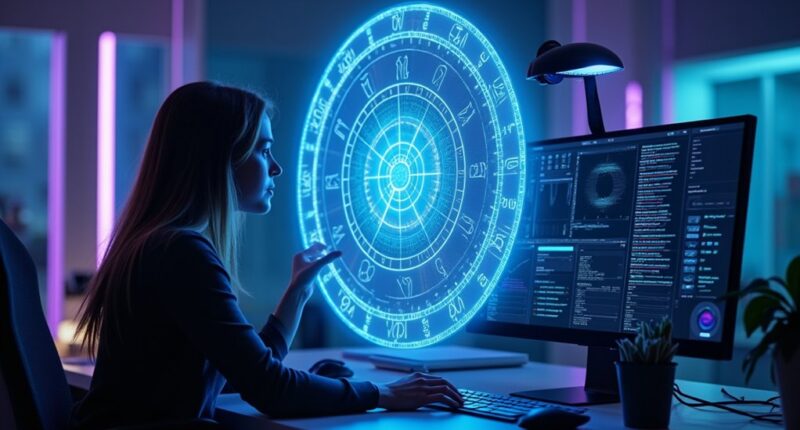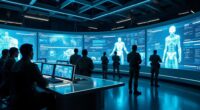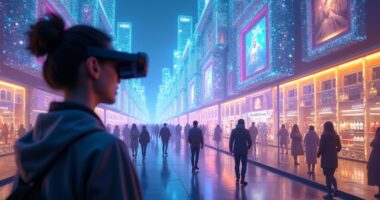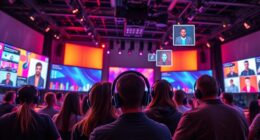Your belief in astrology influences how you interpret AI-generated horoscopes, shaping your trust and engagement with these predictions. If you see astrology as relevant to your life, you’re more likely to accept and act on insights from digital forecasts. Those with a strong superstition tend to favor AI insights for personal decisions, while skeptics remain cautious. To understand how your mindset can impact your use of AI, keep exploring this intriguing connection.
Key Takeaways
- Belief in astrology increases openness to AI-generated horoscopes and personalized insights.
- Trust in astrology can lead to greater acceptance and reliance on AI tools for life guidance.
- Individuals with lower scientific literacy may favor AI-based predictions aligned with astrological beliefs.
- Integration of AI with psycho-astrological counseling enhances self-awareness and mental health support.
- Perceptions of astrology influence how users interpret and engage with AI-driven forecast applications.

Have you ever wondered how artificial intelligence is transforming the way we interpret horoscopes? As technology advances, AI is becoming a powerful tool in understanding and personalizing astrology in ways never before possible. Your beliefs about astrology can considerably influence how you interact with AI predictions. Studies reveal that people who trust in astrology are more likely to find AI-generated forecasts valid, reliable, and tailored to their lives. This shared psychological trait suggests that superstition and personal biases play a role in accepting both traditional and digital predictions. If you’re inclined to believe in astrology, you might also be more receptive to AI’s ability to offer personalized insights, especially when it touches on areas like investing, relationships, or health.
Believing in astrology can make you more receptive to AI-driven personalized insights across life areas.
Your level of education and cognitive ability also shapes how you perceive AI and astrology. Those with lower scores on vocabulary or cognitive tests tend to endorse astrology more strongly, likely because of limited scientific literacy or superficial knowledge. Fewer years of formal education correlate with greater acceptance of astrology as a legitimate science. Conversely, individuals with higher education and critical thinking skills are more skeptical, often questioning the validity of both traditional horoscopes and AI predictions. This suggests that improving scientific literacy and critical thinking through targeted educational programs can help you develop a more nuanced understanding, reducing reliance on superstition and unfounded beliefs. The study found that only a small portion of the population rejects astrology outright, while a significant number see it as a form of entertainment or personal insight, regardless of scientific consensus. Understanding the role of color accuracy in interpreting information can enhance your engagement with both astrology and AI.
AI’s role in horoscope interpretation is expanding rapidly. Sophisticated algorithms analyze complex planetary interactions within entire birth charts, delivering more detailed and nuanced readings than traditional horoscopes. These AI systems can identify subtle patterns in astrological data, creating personalized insights that align closely with your unique profile. As a result, you’re likely to find AI-generated horoscopes more engaging and accurate, especially when they incorporate data-driven analysis, surpassing the generalities of conventional predictions. Additionally, AI tools assist professional astrologers by automating labor-intensive tasks, allowing them to focus on interpretive depth and personalized counseling. This symbiosis enhances the overall quality and relevance of horoscopic guidance you receive.
AI is also integrating with psycho-astrological counseling, aiming to boost mental health and self-awareness. Platforms like AstroAI combine astrological principles with psychological models, using deep learning to predict personality traits and tailor counseling approaches. Although still in early stages, initial results are promising, indicating that AI can help you better understand yourself and navigate emotional challenges. This fusion supports holistic well-being by empowering individuals with personalized insights rooted in both astrology and psychological science. As AI continues to evolve, it’s likely to revolutionize how you engage with horoscopes, making them not just predictive tools but also catalysts for self-discovery and mental wellness.
Frequently Asked Questions
Can Astrology Predict AI Trends?
Yes, astrology can predict AI trends by analyzing celestial patterns linked to technological shifts. You might see AI advancements reflected in planetary movements, guiding predictions about innovation cycles and societal impacts. Using AI-powered astrology, you can spot emerging trends, understand collective behaviors, and anticipate breakthroughs. While not definitive, this approach offers a unique perspective, helping you stay ahead in a rapidly evolving tech landscape by aligning celestial insights with AI developments.
Do Zodiac Signs Influence Tech Preferences?
Did you know that nearly 60% of people believe their zodiac sign influences their tech choices? Yes, zodiac signs do influence your tech preferences. For example, water signs tend to favor emotionally connected and creative tools, while fire signs look for innovative, cutting-edge technology. Your zodiac traits can guide you toward devices and applications that better match your personality, making your digital experience more aligned and satisfying.
How Do Horoscopes Interpret AI Behavior?
You interpret AI behavior through horoscopes by analyzing planetary influences and celestial alignments that symbolize technological traits. For example, Mercury’s position might highlight communication skills, while Uranus could indicate innovation. By examining these astrological factors, you gain insights into AI’s decision-making patterns, adaptability, and potential biases. This approach helps you understand how AI systems might evolve, improve, or behave under different cosmic influences, guiding your interactions and expectations effectively.
Are There Zodiac-Based AI Algorithms?
Yes, there are zodiac-based AI algorithms used in astrology platforms. You input your birth details, and the AI analyzes your natal chart using planetary positions and zodiac signs. These algorithms generate personalized horoscopes, compatibility insights, and predictions by identifying patterns within astrological data. They continuously improve through user feedback, ensuring more accurate and relevant guidance. These systems combine traditional astrology with advanced machine learning to deliver tailored, real-time insights.
Can AI Improve Horoscope Accuracy?
AI can improve horoscope accuracy like sharpening a blade—making predictions more precise. By analyzing vast amounts of astrological data and personal information, AI uncovers patterns humans might miss. This enhances personalized horoscopes and forecasts, giving you insights tailored to your unique chart. While it’s not foolproof, AI’s analytical power can make horoscopes more relevant and detailed, helping you better understand yourself and navigate life’s twists and turns.
Conclusion
Your horoscope might be a mirror reflecting your tendencies, but when paired with AI, it becomes a compass guiding your choices. Think of it as a dance where stars and algorithms lead you through possibilities, shaping your decisions like a master sculptor. Embrace this synergy, and you’ll discover that your fate isn’t set in stone—it’s a canvas you paint with the colors of your beliefs and technology. Together, they can craft a future uniquely yours.









